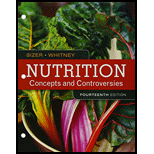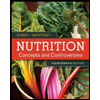
Concept explainers
Your daughter is leaving for college in the fall. Recently, there has been disturbing news about the excessive drinking on college campuses and even a report about the death of one student who had been drinking excessively at the college your daughter is planning to attend. Form a group of four or five people. Each group has an imaginary daughter who is leaving for college. Each member of the group will choose one of the topics listed below' and prepare a short (one-minute) speech that attempts to educate your daughter on the dangers of excessive drinking. To facilitate the speaker’s delivery, a group member takes on the role of "daughter," rotating the role with each speaker. Be sure to emphasize facts as much as possible with your argument.
Explain the physiology of the hangover, including dehydration, formaldehyde, and methanol.
Discuss the role of alcohol in weight gain.
Describe alcohol’s effect on vitamins.
Describe the effect of alcohol on the heart and brain.
Describe alcohol's effect on the liver and other organs.
Want to see the full answer?
Check out a sample textbook solution
Chapter 3 Solutions
Bundle: Nutrition: Concepts and Controversies, Loose-leaf Version, 14th + MindTap Nutrition, 1 term (6 months) Printed Access Card
- A/An _______________ is performed to gain access to the brain or to relieve intracranial pressure.arrow_forwardGinas physician ordered laboratory tests that would enable him to establish a differential ________________________________to identify the cause of her signs and symptoms.arrow_forwardAn abnormolly is any deviation from what is regarded as normal.arrow_forward
 Nutrition: Concepts and Controversies - Standalo...Health & NutritionISBN:9781305627994Author:Frances Sizer, Ellie WhitneyPublisher:Brooks Cole
Nutrition: Concepts and Controversies - Standalo...Health & NutritionISBN:9781305627994Author:Frances Sizer, Ellie WhitneyPublisher:Brooks Cole Medical Terminology for Health Professions, Spira...Health & NutritionISBN:9781305634350Author:Ann Ehrlich, Carol L. Schroeder, Laura Ehrlich, Katrina A. SchroederPublisher:Cengage LearningEssentials Health Info Management Principles/Prac...Health & NutritionISBN:9780357191651Author:BowiePublisher:Cengage
Medical Terminology for Health Professions, Spira...Health & NutritionISBN:9781305634350Author:Ann Ehrlich, Carol L. Schroeder, Laura Ehrlich, Katrina A. SchroederPublisher:Cengage LearningEssentials Health Info Management Principles/Prac...Health & NutritionISBN:9780357191651Author:BowiePublisher:Cengage





